Pleasure will be headlining the 52nd Annual Oregon Juneteenth Festival on Saturday, June 15, 2024, at Lillis-Alvin’s Park.
This show will be the band’s first performance this year and will also mark the band’s first performance since the passing of founding member Donald Hepburn. He passed earlier this year. It will be a homecoming for the Portland band who last played at Revolution Hall in 2023.
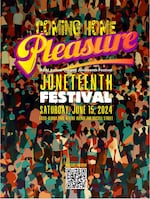
Pleasure headlines Oregon Juneteenth Festival
Pleasure Music Group
***
In September 2023, the Portland band Pleasure played together for the first time in almost 40 years. The long-awaited show at Portland’s Revolution Hall felt like a celebration with close friends.
“It felt strange but it felt really, really good after all these years to get up there,” bass guitarist Nate Phillips said. “To just enjoy the idea that here we are on stage together playing these songs.”
Even though the room at Revolution Hall is big, the show felt small and intimate. There was plenty of room for fans to dance in the aisles. Pleasure once shared big stages with big names including The Commodores, Kool & the Gang and Earth, Wind & Fire. Their sound influenced Questlove, Janet Jackson and countless others. The band split up in the 1980s, and there have been other reunion attempts since, but the show this fall was different.
“Although you could technically count the reunion show that we did at the Mount Hood Jazz Festival in 1995, it’s not really a Pleasure show because there were no Pleasure vocalists,” keyboardist Michael Hepburn said. “Compare that to Revolution Hall where we played a huge number of recorded material and material we’ve never had a chance to play.”
Four of the original members were there performing along with two newcomers. They were joined on stage by other musicians including vocalists, a trombone player and trumpet player. There has even been talk of taking the group on tour.
“The fans are still responsive. They knew the songs and were singing along,” Phillips said. “They were extremely supportive of every note we played.”
Where it all began
Pleasure originally formed in the late 1960s when two different bands made up of Portland high school students combined: The Soul Masters and The Franchise.
In 1968, keyboardist Donald Hepburn (Michael’s brother) put together a quartet for the Jefferson High School Soul Assembly, held at the then Civic Auditorium (now Keller Auditorium).
“The band would begin to grow and include musicians from around Portland who would sit in and play,” said Donald Hepburn, whose group became known as The Soul Masters.
Eventually The Soul Masters wound up playing at a legendary Portland jazz club called The Upstairs Lounge. It was there that they met The Franchise.
Members of The Franchise grew up trying to emulate the records they heard at each other’s houses. They made their own drums and guitars with cardboard and strings, and eventually graduated to the real thing.
When Michael Hepburn first saw The Franchise at The Upstairs Lounge, he thought they had a sound he wanted to aim for. “It was a beacon that pointed in a direction of the way that we wanted to have an ensemble of people play,” said Hepburn. “They were playing everything from Buddy Miles, Jimi Hendrix to Grand Funk Railroad.”
In 1972, Michael Hepburn came across an advertisement for JB Scotch Whiskey, which was described as a “rare pleasure.”
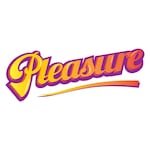
an image of logo from the Portland band Pleasure
Courtesy of Pleasure Music Group
“I thought: ‘That’s what people want, it’s what they want from music,’” said Hepburn, who realized it would be a good name for the combined bands. “I offered it up. Everybody had a vote and thought if it had a name and hook then it’s good.”
Pleasure began playing at The Upstairs Lounge regularly in the early ‘70s, where they met a lot of musicians traveling through Portland. In July 1973, The CTI All Stars, a collection of jazz notables, played a show at the Paramount Northwest, now Arlene Schnitzer Concert Hall. Pleasure was also playing that night across town.
Michael Hepburn recalls the impact of that night in Pleasure’s career
“We took a break from playing and we were hanging out in the kitchen.” Hepburn said. “Word had traveled to the CTI All-Stars about us playing. They came through and we got a chance to meet them.”
Pleasure even got the chance to open for B.B King. The list of musicians that crossed paths with Pleasure continued to grow.
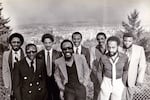
A photo of the group Pleasure
Pleasure Music Group / Albina Music Trust
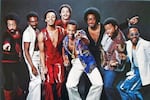
The group Pleasure dressing up for a photoshoot
Pleasure Music Group
“We’d be on stage then Lakeside would come in or the Whispers,” Phillips remembers. “Every time Grover [Washington] was in town, he’d start playing on stage.”
The relationship with Grammy-award winning saxophonist Grover Washington proved to be instrumental for Pleasure. It was Washington who told the band to send their demo tape to Wayne Henderson, one of the cofounders of the influential band the Jazz Crusaders (later The Crusaders).
“Wayne came and listened to us,” Michael Hepburn said. “He came to the music studio early in the morning after a Crusaders gig.” But Henderson couldn’t do much with a band based in Portland.
So the band members bought an old white Franz Wonder bread truck for $200 and made the trip to Los Angeles with their equipment. They traveled in the summer of 1974, since some of the members were still in high school and had to receive permission from their parents.
Pleasure played at the Whiskey A Go Go on Sunset Boulevard and Mavericks Flats on Crenshaw Boulevard.
Henderson arranged for all the major labels to attend the Whiskey for a show one night.
“Wayne told us the major labels were going to be there in the audience and we were kind of nervous,” Phillips said. “We got on stage and played ... I don’t think we had a great show. It wasn’t our best night. Wayne agreed. He said ‘The show was terrible.’ He went out to the audience and he came back with this gentleman. His name was Ralph Kaffel.”
Kaffel, the president of Fantasy Records, apparently had a different view of the band’s performance that night — he signed the group right away.
The band’s reputation slowly built following the success of their records on the chart.
They were involved in more writing and production work over time which Wayne Henderson encouraged.
Bruce Smith, an original member of Pleasure who played hand drums and percussion instruments, recalls the early show days.
“We had bought this old bus that had the Challenger written on it. It was all broken down.” Smith said “We didn’t have the fancy stuff then. Some of the other groups were laughing but we got on that stage and we just killed.
Their fifth album, “Future Now,” was released in 1979 and really helped to cement their legacy. The biggest song on the album was called “Glide.”
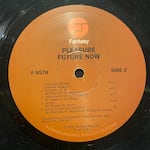
An image of the Future Now album from the band Pleasure. This is the groups' fifth album which features the song Glide
Steven Kray / OPB
“When the record came out and feedback came back: Everyone likes “Future Now” but everyone seems to really like the last song called ‘Glide.’” Phillips said. “We were just making records the best way we knew how and that song seemed to stand out.”
Pleasure’s success was massive. They headlined in Philadelphia over Harold Melvin and the Blue Notes who at the time were a major international act from Philadelphia. During that show, Grover Washington came out and played with Pleasure on stage in a full circle moment.
In 1995, they played with Wayne Henderson at the Mt. Hood Jazz Festival.
Pleasure shared the stage with some of the biggest acts of all time including Frankie Beverly & Maze, Papa John Creach, Jimmy Castor Bunch, Slave, Ohio Players, Bar Kays, War, Cameo, Con Funk Shon and so many others.
‘We just owe it to them to get out and play’

A tour poster on display at the venue. The Portland band Pleasure played for the first time in 40 years at Revolution Hall
Paul Marshall / OPB
Pleasure’s work is still being used and sampled in film, television and music. In Questlove’s 2021 book “Music is History,” he mentions the song “Glide” and its impact on him. He included two versions of “Glide” on the curated playlist for former First Lady Michelle Obama’s book tour for her 2018 memoir, “Becoming.”
The song “Bouncy Lady” was featured in the video game Grand Theft Auto V. The song “Let’s Dance” was in the 2018 film Uncle Drew.
In the 1990 film House Party, “Joyous” was sampled on two of the records from the movie’s soundtrack including a scene that features a notable rap battle between the two stars, Kid N Play.
Artists like Janet Jackson, Miles Davis, DJ Jazzy Jeff & The Fresh Prince, Daft Punk and many others have sampled Pleasure’s work.
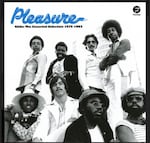
Cover of compilation album for the group Pleasure
Pleasure Music Group
Member Bruce Smith attended a Janet Jackson concert and experienced a full circle moment:
“The (”Joyous”) sample that they did on Janet Jackson’s “Velvet Rope” album. They did a piece of it in her concert.” Smith remembers. “I was there in the audience and I said oh man. They’re playing it and that feels good to hear.”
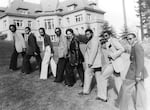
Members from the group Pleasure
Pleasure Music Group
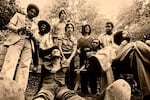
A photo of the group Pleasure in the outdoors
Pleasure Music Group
The impact of Pleasure’s work is far reaching. Guitarist Doug Lewis, another original member of Pleasure, recalls a personal moment of Pleasure’s influence.
“When I was in Japan, this rapper came up to me and asked me to listen to this song he made. He played it for me. It sampled “Universal” from the Future Now album. The rapper asked me if I liked the song. I told him that the song sounded alright and that I also wrote it,” Lewis continues. “The rapper looked at me and he disappeared after that. He thought I was going to sue him because he took the samples. It was his song. I just told him that I co-wrote it. Good music is good music.”
The band hopes to play more shows in the future, but the show at Revolution Hall was a big step for Pleasure.
“A lot of those songs were memory stamps of what [the people in the audience] were going through during their life at a certain time in their lives,” Phillips said.” They missed that and I didn’t quite understand until after the show. They’re reliving aspects of their lives that hopefully helped them or help them feel a certain way about what they were going through. We just owe it to them to get out and play.”
Pleasure is working on making songs from the Revolution Hall show available to listen to via streaming.

